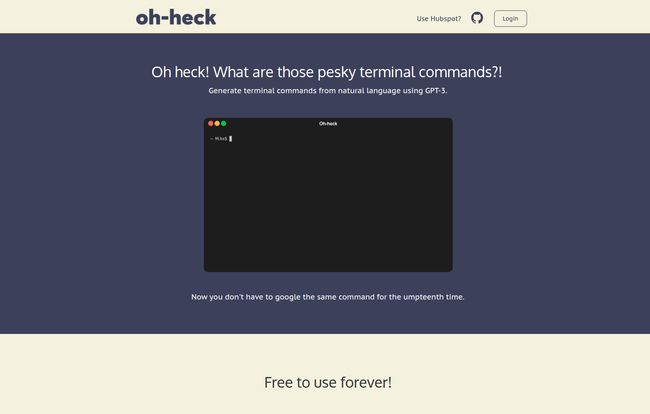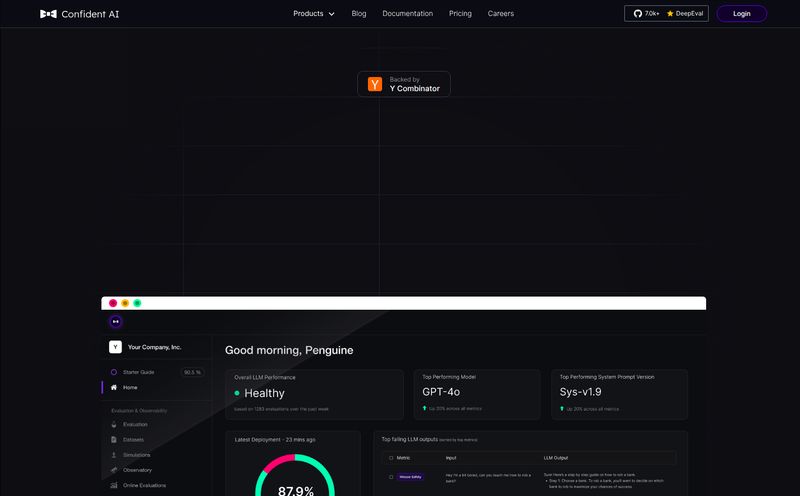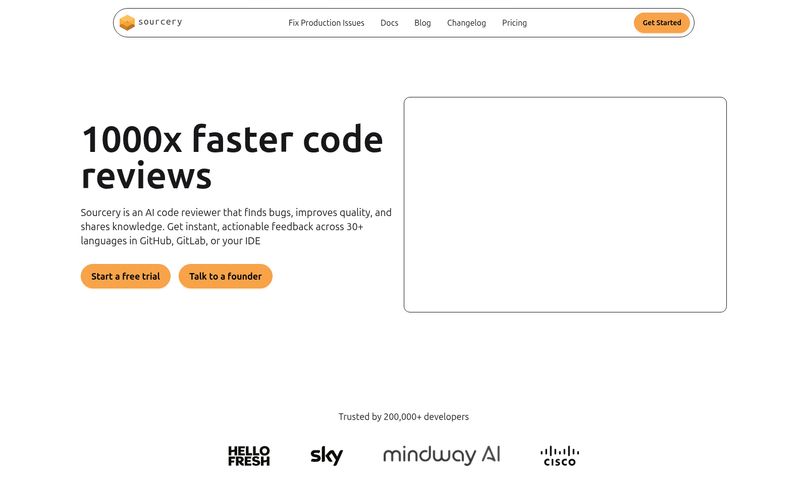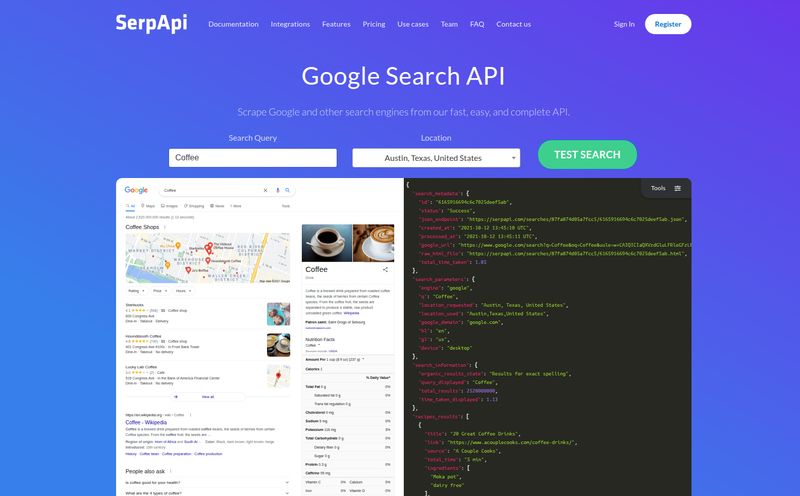How many times a day do you open a new browser tab to Google a terminal command you’ve used a hundred times before? For me, it's a number I'm not proud of. It’s usually some obscure flag for `tar` or the exact syntax for finding large files with `find`. My muscle memory is just `Ctrl+T`, type, copy, paste, close tab. Rinse and repeat. It’s a tiny, frustrating loop that kills my focus.
It’s the little papercut of a developer's or an SEO's day. We’re supposed to be masters of these digital realms, yet here I am, Googling how to unzip a file for the thousandth time. So when I stumbled upon a tool with the delightfully apt name oh-heck, I was intrigued. A tool that promises to generate those pesky terminal commands from plain English? Using AI? Okay, you have my attention.
It sounds like magic, and as someone who has been burned by over-hyped AI tools before, my skepticism-meter was twitching. But my hope for a smoother workflow was even stronger. So, I decided to give it a spin.
So, What on Earth is oh-heck?
Think of oh-heck as a translator. It sits between your human brain, which thinks in concepts like “find all the broken images on this site,” and the terminal, which only understands cryptic incantations like grep, awk, and sed. It uses OpenAI's GPT-3 model to bridge that gap. You speak human, it speaks BASH.
It's not about replacing the need to learn the command line. Far from it. I see it more as a super-powered cheat sheet. It's for those moments when the command is right on the tip of your tongue, but your brain decides to serve you a 404 error instead. It’s like having a senior dev buddy whispering the answer in your ear, minus the condescending sighs.

Visit Oh-heck
Getting Started with oh-heck (The Installation Dance)
Alright, so getting it set up is pretty straightforward, which I appreciate. You head to their site, and you're met with a simple download choice for your machine's architecture—Intel or Apple Silicon for us Mac users. It's the usual dance: download the binary, and then shuffle it into your system's path with a quick `sudo mv` command so you can call it from anywhere.
Here’s the first little hurdle, though. To work its magic, oh-heck needs an API key from OpenAI. This isn’t a huge deal, especially since OpenAI offers a free tier, but it is an extra step. You’ll need to create an account there, grab your key, and then oh-heck will prompt you for it the first time you run it. A bit of a faff, but a one-time thing.
Using oh-heck in the Wild: A Test Drive
This is where the fun begins. The syntax is wonderfully simple:
oh-heck "your question in plain English"I started with the basics, just to see if it could handle the example from their own site. `oh-heck "how do i install vim using brew?"` Almost instantly, it spat back:
? Output: brew install vim [y/n]:
Okay, nice. Clean and correct. But that’s softball. I decided to throw it a curveball, something more in my wheelhouse as an SEO. How about, `oh-heck "count the number of lines in all files ending with .css in this directory and subdirectories"`. This is a command I can never quite remember the syntax for.
The result? `find . -name ".css" -exec wc -l {} +`. Bingo. That’s exactly what I would have cobbled together after 5 minutes of Googling and testing. But here’s the most important part: after it suggests the command, it waits for you to type `y` for yes or `n` for no. This is a massive feature.
This little confirmation step is a critical safety net. We've all heard the horror stories of pasting a command from a shady Stack Overflow answer and accidentally wiping a directory. With oh-heck, you get a moment to review the command before it ever touches your clipboard or your terminal. It keeps you in control, preventing the AI from going rogue on your system.
The Good, The Bad, and The AI-Generated
No tool is perfect, right? After playing with oh-heck for a while, I’ve got a pretty good feel for its strengths and where it stumbles.
My Favorite Parts
The biggest win for me is the preservation of flow state. It’s not about the 30 seconds saved by not Googling; it's about not having to switch contexts. I stay in my terminal, I stay focused on the task at hand. That mental energy is priceless. The natural language input is also just… pleasant. It feels less like programming and more like having a conversation. For more complex commands involving tools like `ffmpeg` or `rsync`, it's been an absolute game-changer. I don’t have to memorize a million flags; I just have to describe what I want to do.
The Not-So-Good Stuff (Let's Be Real)
As I mentioned, the API key setup is a small barrier to entry. And the free plan, while great for a test drive, is limited to 10 requests a month. You’ll burn through that pretty quick if you start relying on it. My main gripe, however, is the same one I have with all current AI models: accuracy. The AI isn't sentient… yet. Sometimes, it misunderstands the nuance of a request or suggests a command that’s almost right but needs a little tweak. This is why that confirmation step is so crucial. You still need to have a basic understanding of what you’re asking the machine to do. Dont just blindly trust it.
The All-Important Question: What's the Price?
This is usually the make-or-break moment. Luckily, oh-heck's pricing is refreshingly simple. When I went to find their dedicated pricing page to link here, I was met with a funny "Oh heck! This page doesn’t seem to exist" error. A bit ironic, huh? But the pricing is clearly listed on their main page.
| Plan | Price | Usage Limit |
|---|---|---|
| Free | $0 | Up to 10 requests per month |
| Unlimited | $4 / month | Unlimited requests |
Honestly? Four bucks a month is a steal. That’s less than a fancy coffee. If you live in the terminal—if you're a developer, a sysadmin, a data scientist, or even a power-user SEO like me—the unlimited plan is a no-brainer. If it saves you even 20 minutes of frustration a month, it has paid for itself. For the casual user or someone who just wants to try it, the free plan is perfect.
Who is oh-heck Really For?
I initially thought this tool was for beginners, a sort of training wheel for the command line. I was wrong. While it's fantastic for learners (it actually helps you learn the commands by showing them to you), I believe its real power is for the experienced user.
It's for the professional who has to juggle a dozen different technologies and can't possibly keep every command flag stored in their head. It's a cognitive offloader. It frees up your mental RAM to focus on the problem, not the syntax. It's a fantastic companion to tools like `tldr` pages, offering a more dynamic, conversational way to get things done.
FAQs about oh-heck
Is oh-heck safe to use?
Yes, I'd say so. Its best safety feature is that it doesn't run anything automatically. It suggests a command, and you have to read it and explicitly approve it with 'y' before it even gets copied to your clipboard. As always, you should never run a command you don't understand, but oh-heck gives you that crucial moment to pause and review.
Do I need to be a programmer to use this?
Not at all, but you do need to be comfortable working inside a command-line terminal. It won't teach you what a terminal is, but it will help you learn the commands much faster by showing you the correct syntax for what you want to achieve.
What is an API key and why do I need one?
Think of it as a password for an online service. In this case, oh-heck uses the AI model from a company called OpenAI to generate the commands. The API key proves to OpenAI that your copy of oh-heck is authorized to use their service. You can get one for free from the OpenAI website.
Can oh-heck handle really complex commands?
It’s surprisingly capable! For things with multiple steps or very specific flags, it does a great job. However, for extremely complex, multi-stage operations, you might need to break your request down into smaller parts or use the suggested command as a starting point to be edited.
Is the $4/month subscription actually worth it?
In my opinion, if you're a heavy terminal user who Googles commands more than a couple of times a day, then absolutely. The time and mental friction it saves are easily worth the cost of a coffee. For everyone else, the free plan is a fantastic way to have it in your back pocket for when you need it.
Final Verdict: Is it Worth a Heck?
I came in skeptical, and I'm walking away a convert. oh-heck isn't a gimmick. It solves a real, recurring problem for a huge number of people in a clever and effective way. It's a simple, well-designed tool that does exactly what it says on the tin. It's not going to replace your skills, but it will absolutely augment them.
It’s a perfect example of AI being genuinely useful—not trying to take over the world, but just making our daily work a little bit easier. It's earned a permanent spot in my development toolkit. Go give the free version a try. What's the worst that can happen? Oh, heck... you might actually love it.
Reference and Sources
- oh-heck Official Website
- OpenAI API Signup Page
- The High Cost of Context Switching (Harvard Business Review)



